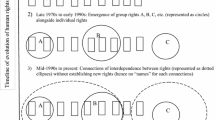Abstract
Is there a crisis of legitimacy in relation to fundamental human rights commitments? At one level, the human rights regime has endured legitimacy problems from the outset, in part due to the scope and complexity of the standards but also as a result of the unwillingness of states to regard human rights norms as properly binding. I argue that September 11 and the responses this event triggered in the foreign policies of leading states in international society have taken the challenge to the regime to a new level. What makes it a crisis of legitimacy is the fact that those were crucial to the emergence of the regime, and the rights that are under siege are core ‘rights of the person’ and not aspirational rights. The closing discussion examines the possibility for a restoration of legitimacy. Consistent with the earlier theoretical discussion, the question of whether and how the legitimacy crisis can be resolved requires a differential response, depending on the site of the crisis, and the location of the audience. The concepts of international and world society provide analytical leverage in identifying both the causes of the crisis and the prospects for its resolution.
Similar content being viewed by others
References
Amnesty International (2006) United Kingdom Human Rights: A Broken Promise, London: Amnesty International.
Blair, T. (2005) ‘Prime Minister's Press Conference’, August 5, www.directgov.co.uk.
Clark, I. (2005) Legitimacy in International Society, Oxford: Oxford University Press.
Clark, I. (2007) International Legitimacy and World Society, Oxford: Oxford University Press, forthcoming.
Danner, M. (ed.) (2005) Torture and Truth: America, Abu Ghraib and the War on Terror, London: Granta Books.
Donnelly, J. (2003) Universal Human Rights in Theory and Practice, 2nd edn., Ithaca: Cornell University Press.
Echeverria, G. and Wilmshurst, E. (2006) ‘Torture: An Overview of the Law’, IL BP 06/01, London: Chatham House.
Foot, R. (2006) ‘Torture: The Struggle over a Peremptory Norm in a Counter-Terrorist Era’, International Relations 20 (2): 131–151.
Forsythe, D.P. (2004) ‘US Foreign Policy and Human Rights in an Era of Insecurity’, in M.E. Crahan, J. Goering, and T.G. Weiss (eds.) Wars on Terrorism and Iraq: Human Rights, Unilateralism, and US Foreign Policy, New York: Routledge.
Human Rights Watch (2006) World Report 2006, New York: Human Rights Watch and Seven Stories Press.
Luban, D. (2005) ‘Liberalism, Torture, and the Ticking Bomb’, Virginia Law Review 91 (6): 1425–1461.
Reus-Smit, C. (2001) ‘Human Rights and the Social Construction of Sovereignty’, Review of International Studies 27 (4): 519–538.
Risse-Kappen, T., Ropp, S.C. and Sikkink, K. (1999) The Power of Human Rights: International Norms and Domestic Change, Cambridge: Cambridge University Press.
Sands, P. (2005) Lawless World: America and the Making and Breaking of Global Rules, London: Penguin.
Sikkink, K. (2005) ‘United States Compliance with International Human Rights Law’, Honolulu, March 1–4.
United Nations (2006) ‘60th General Assembly Plenary’, General Assembly GA/10449, www.un.org/News/Press/docs/2006/ga10449.doc.htm.
Vincent, R.J. (1986) Human Rights and International Relations, Cambridge: Cambridge University Press in association with Royal Institute of International Affairs.
Wheeler, N.J. (2000) Saving Strangers: Humanitarian Intervention in International Society, Oxford: Oxford University Press.
Author information
Authors and Affiliations
Additional information
Participating in two workshops on the thematic of legitimacy crises was a very enriching experience: many thanks to Ian Clark and Christian Reus-Smit for organising the project and to the British Academy for funding it. In addition to the guidance of the editors, I received extremely valuable comments from two anonymous referees and all the other workshop presenters (in particular Ian Clark and Ian Hurd). David Armstrong, Ken Booth, Rosemary Foot, and Nick Wheeler provided advice and guidance. The usual caveats apply.
Rights and permissions
About this article
Cite this article
Dunne, T. ‘The Rules of the Game are Changing’: Fundamental Human Rights in Crisis After 9/11. Int Polit 44, 269–286 (2007). https://doi.org/10.1057/palgrave.ip.8800188
Published:
Issue Date:
DOI: https://doi.org/10.1057/palgrave.ip.8800188




